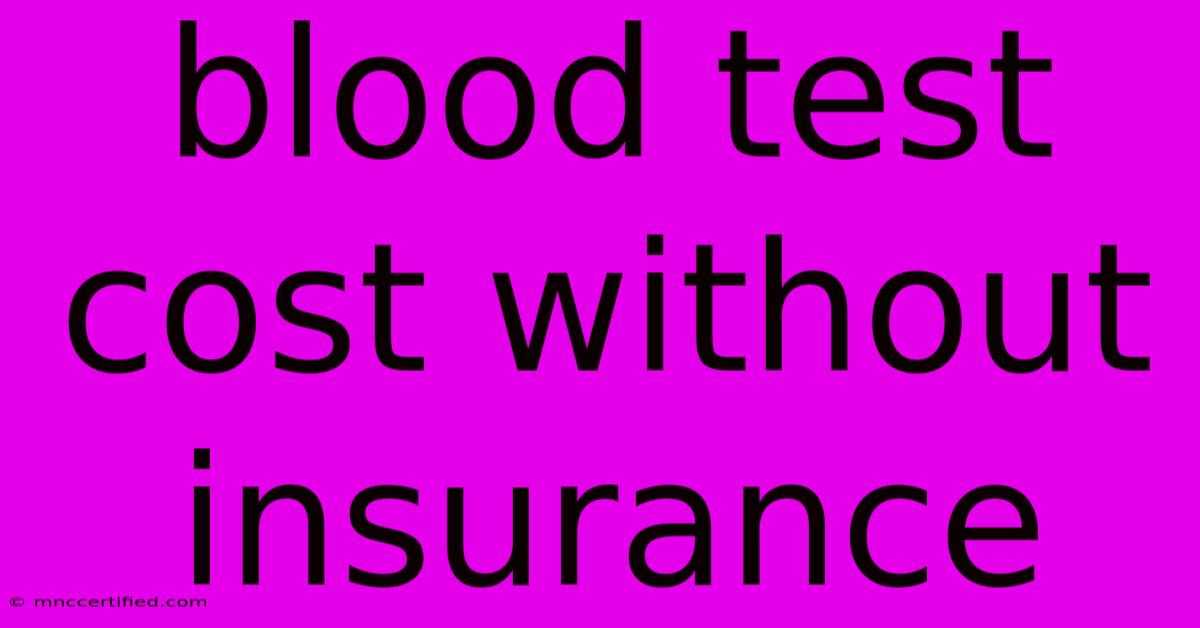Blood Test Cost Without Insurance

Table of Contents
Blood Test Cost Without Insurance: A Comprehensive Guide
Getting a blood test without insurance can feel daunting. The cost varies widely depending on several factors, and understanding these factors is crucial to budgeting effectively. This guide breaks down the cost of blood tests without insurance, offering strategies to save money and ensuring you get the best value for your healthcare needs.
Factors Affecting the Cost of Blood Tests Without Insurance
Several key factors significantly influence the price you'll pay for a blood test without insurance:
-
Type of Test: A simple complete blood count (CBC) will be far cheaper than a complex panel of tests like a lipid panel, liver function test (LFT), or thyroid panel. Highly specialized tests, such as genetic testing or allergy panels, will command the highest prices. Knowing precisely which test you need is the first step in estimating the cost.
-
Location: Costs vary drastically depending on your geographic location. Urban areas with high competition might offer slightly lower prices compared to rural areas with limited healthcare providers. Consider checking prices from multiple labs in your area.
-
Lab Facility: Independent labs, hospital labs, and physician's office labs all have different pricing structures. Independent labs often offer competitive rates, while hospital labs might be more expensive. Comparing prices between different facilities is highly recommended.
-
Additional Services: Some labs might charge extra fees for services like same-day results or home-visit blood draws. Understand all associated fees upfront to avoid unexpected charges.
How Much Can You Expect to Pay?
Unfortunately, there's no single answer to this question. The cost can range from a few tens of dollars for a basic CBC to several hundred dollars for extensive panels or specialized tests. Expect to pay significantly more without insurance than with it.
To get a realistic estimate, it's essential to:
- Contact labs directly: Call local labs and inquire about the cost of the specific blood test you need. Be prepared to provide details of the test requested.
- Check online resources: Some labs list their prices online, though this information may not always be complete or up-to-date.
- Use price comparison tools: While less common for blood tests specifically, some online tools compare healthcare prices in your area.
Tips for Saving Money on Blood Tests Without Insurance
- Look for discounts: Some labs offer discounts for cash payments or early morning appointments. Ask about any potential discounts during your inquiry.
- Consider bundled tests: If you need multiple tests, inquire if a bundled package is cheaper than ordering each test individually.
- Negotiate prices: While less common, it's worth trying to negotiate the price, especially if you're paying out-of-pocket and the cost seems excessively high.
- Check for financial assistance programs: Some community health centers or non-profit organizations may offer financial assistance for low-income individuals.
Alternatives to Traditional Labs
For less urgent testing, some options might lower costs:
- Home testing kits: For certain tests like cholesterol or glucose, at-home testing kits are available, though accuracy might differ compared to lab results. Always check reviews and validation before considering this option.
- Retail Clinics: Retail clinics like those found in pharmacies often offer blood tests at lower costs than traditional labs, but their range of tests might be limited.
Conclusion
Navigating the cost of blood tests without insurance requires proactive research and careful planning. By comparing prices, understanding the factors influencing costs, and exploring potential savings strategies, you can get the necessary testing while minimizing expenses. Remember, prioritizing your health is paramount, but smart budgeting can significantly alleviate the financial burden of healthcare costs.

Thank you for visiting our website wich cover about Blood Test Cost Without Insurance. We hope the information provided has been useful to you. Feel free to contact us if you have any questions or need further assistance. See you next time and dont miss to bookmark.
Featured Posts
-
Jane Moore Tv Presenter And Celeb
Nov 18, 2024
-
Live Wales Vs Australia Rugby With Gatland
Nov 18, 2024
-
Lafayette Street Bond No 9 Review
Nov 18, 2024
-
Prudential Core Plus Bond Fund 15
Nov 18, 2024
-
Bellinghams 8 England Ireland Ratings
Nov 18, 2024